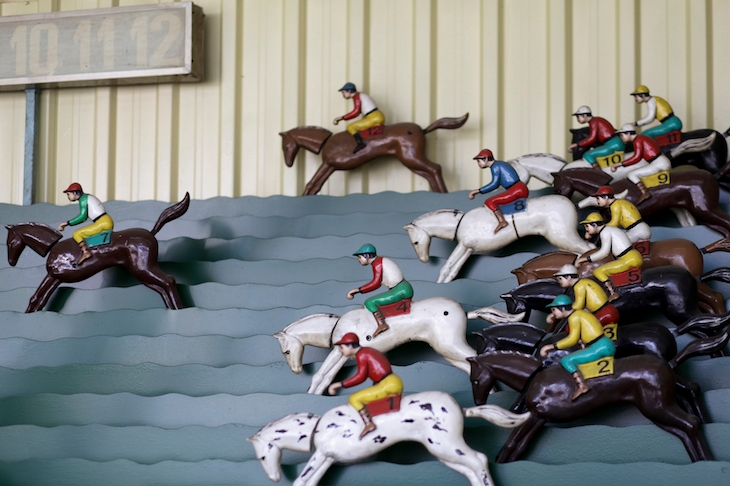You can tell by the tone of the jokes how most occupations are regarded and we’ve all heard the traditional ones about the old enemy. ‘Why don’t sharks attack bookies?’ ‘Professional courtesy’. ‘Why did God invent bookmakers?’ ‘To make used-car salesmen look good.’ ‘Why are bookmakers buried an extra six feet down?’ ‘Because deep down they are very nice people.’
OK, such stories are applied to lawyers too. And journalists. But as a Racing Post headline confirmed last week, bookmakers are under heavy pressure. William Hill has been fined £6.2 million for breaching regulations on social responsibility and on money laundering. For example, it allowed a customer to deposit £541,000 over 14 months on the unprobed assumption that his income was £365,000 a year. In fact, he was earning £30,000 and was funding his habit by stealing from his employer.
The advertising watchdog the Committee of Advertising Practice has announced a crackdown on Bet Now! TV advertisements. The betting industry is panicking over the government’s planned reductions on the maximum amount that punters can stake on fixed-odds betting terminals (which could see the sum reduced from £100 to a mere £2) and there is growing alarm across all political parties about problem gambling. The Gambling Commission estimates that there are some 430,000 problem gamblers with another two million at risk. The charity GambleAware sees only 8,500 of these a year and its chief Kate Lampard complains that the state spends considerable amounts tackling the problems caused by drugs and alcohol but virtually nothing on those caused by gambling.
The problem for those of us who love racing is that the structures set up long ago made racing’s financing dependent on a levy taken from the profits derived from gambling. Our sport depends on keeping the bookmakers happy by providing enough racing to ensure that punters flock into their betting shops and maximise their turnover. This very week, when the Met Office warned of frost and snow that might cause cancellation of jump-race meetings, the British Horseracing Authority rushed to stage extra Flat race meetings on the ‘all weather’ artificial tracks at Chelmsford, Wolverhampton and Lingfield.
The Association of British Bookmakers has claimed that a significant cut in the FOBT maximum will see the closure of thousands of betting shops, with many jobs lost and a decline of around £290 million in the levy and media-rights income to racing, not to mention a £1 billion-plus loss to the Treasury in lost taxation by 2020. Other leading figures in the industry put racing’s potential loss at nearer £60 million but most of us are in no position to test those figures.
I have to admit to a personal dilemma. Racing is an expensive sport to stage and I don’t want to see its income seriously diminished. But I do acknowledge the seriousness of problem gambling, as illustrated vividly at Kempton Park last Saturday when I overheard a young man screaming down his phone, ‘No I didn’t take that tenner from your bag. No I didn’t. I swear on the lives of our children I didn’t. You must have taken it to play the Lottery.’ I could not oppose a significant cut in the FOBT maximum but at the same time I wonder about the business model of bookmakers who have apparently allowed themselves to become so dependent on the machines.
As always in the run-up to the Cheltenham Festival, Kempton provided a cracking day’s racing. The fact that the French trainer Guillaume Macaire had sent over the talented hurdler Beau Gosse to contest the Adonis Hurdle rather than race him in the mire at Auteuil was yet another reminder to some of us present of the short-sightedness of the Jockey Club’s determination to sell off Kempton for housing. In a winter that has turned the going on many courses into something resembling the bottom of Venice’s Grand Canal, the fast-draining Thameside track has provided trainers with a rare chance to test their horses on something other than glue.
Champion trainer Nicky Henderson, who opposes the closure, was unusually out of luck but declared, after three of his horses — including Cheltenham Gold Cup favourite Might Bite and Champion Hurdle favourite Buveur d’Air — had enjoyed a post-racing gallop: ‘I’ve got three happy horses and three happy jockeys so that makes one happy trainer.’ Nicky also has Altior, the favourite for the Champion Chase, in his Lambourn yard, so if the bookies are under pressure imagine the weight on him as the Festival approaches.
As Nicky reminded visitors to his yard last week, back in 1973 he was assistant trainer to the great Fred Winter who also went to the Festival with short-priced favourites for the big three championship races. Pendil, the best chaser never to win a Gold Cup, was beaten by The Dikler. Bula, winner of the two previous Champion Hurdles, was beaten by Comedy of Errors, and Crisp was turned over by Inkslinger. So we shouldn’t feel too sorry for the bookmakers.






Comments